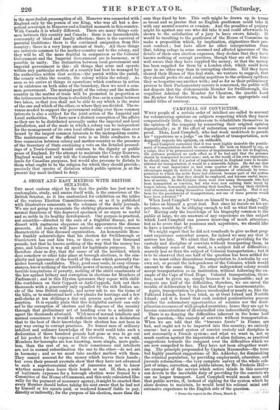A SHORT AND EASY METHOD WITH BRITISH SENATORS.
THE most curious object by far that the public has just now to contemplate, study, and amuse itself with, is the conscience of the British Senator, as it lies anatomized for exhibition on the tables of the various Election Committee-rooms, or as it is published with illustrative comments in the columns of the daily journals. We are not going to enunciate the striking phmnomena or the ab- normal functions of this depraved specimen of an organ so useful and so noble in its healthy development. Our purpose is practical, not scientific—directed to the cure of a frightful disease, not to dissert with rapturous eloquence on the appearances the disease presents. All readers will have noticed one extremely common characteristic of this diseased organization. An honourable Mem- ber frankly acknowledges that his election for Swillborongh or Gnzzletown has cost him two, or three, or even four thousand pounds, but that he knows nothing of the way that the money has gone, and believes it was all spent for legitimate purposes. It is therefore clear as day, that the cause of all the mischief, which does somehow or other take place at borough elections, is the sim- plicity and ignorance of the world of the class which generally fur- nishes borough candidates. They, good easy souls, in easy circum- stances, know nothing of the terrible power of money, nothing of the terrible temptations of poverty, nothing of the strict enactments of the law against bribery and corruption in elections for Members of Parliament ; and in this Elysian ignorance they repose with child- like confidence on their Coppock or Anti-Coppock, fork out their thousands with a generosity only equalled by the rich Indian un- cle of the true British comedy, and never ask to see the items of the bills, or to understand how a few planks for hustings and a few poll-clerks at ten shillings a day can possess such power of ab- sorption. It is equally plain that this delightful naïveté can only act to the corruption of electors and the disgrace of the country through that preliminary act of handing over to a solicitor or agent the thousands aforesaid. With men of normal intellects and normal consciences it would be sufficient to insist on a declaration that to the best of their knowledge their election has not been in any way owing to corrupt practices. No honest man of ordinary intellect and ordinary knowledge of the world could take such a declaration if three hundred pounds had gone or was to go out of his pocket for the expenses of his election. But, as we said, Members for boroughs are less knowing, more simple, more guile- less, than than the rest of us, or their consciences and intellects are not in normal subordination the one to the other—do not act in harmony ; and so we must take another method with them. They cannot account for the money which leaves their hands ; but even their present avowals show that they have not advanced to such a superterrestrial state of innocence as not to know whether money does leave their hands or not. If, then, a scale of legitimate expenses for a borough election were framed by a Committee of the House of Commons, and this scale calculated libe- rally for the payment of necessary agency, it might be enacted that every Member should before tsking his seat swear that he had not by himself. or his agents paid, or rendered himself liable to pay, &redly or indirectly, for the purpose of his election, more than the
sum thus fixed by law. This oath might be drawn up in terms so broad and so precise that no English gentleman could take it with any mental reserve or evasion. And the penalties of perjury might lie against any one who did take it and could afterwards be shown to the satisfaction of a jury to have sworn falsely. It would be insulting to the gentlemen of the House of Commons to make a proposition which, by implication, stiginatizes their pre- sent conduct ; but facts allow no other interpretation than that, taking refuge in some assumed and affected ignorance of the details of their own election expenses, they declare that they have known nothing of corrupt practices, though they are all the time well aware that they have supplied the money, or that the money has been supplied for them by a London club, which could have gone in no other way than in corrupting electors. Till they have cleared their House of this foul stain, we venture to suggest, that they should prefix dis and similar negatives to the ordinary epithets they so bespatter one another with ; and so far as their preliminary process to their Parliamentary careers is concerned, the public will not dispute that the dishonourable Member for Swillborongh, the ungallant Admiral the Member for Cheatem, the ignoble Lord the Member for Guzzletown, would be far more appropriate and candid titles of courtesy.
























 Previous page
Previous page